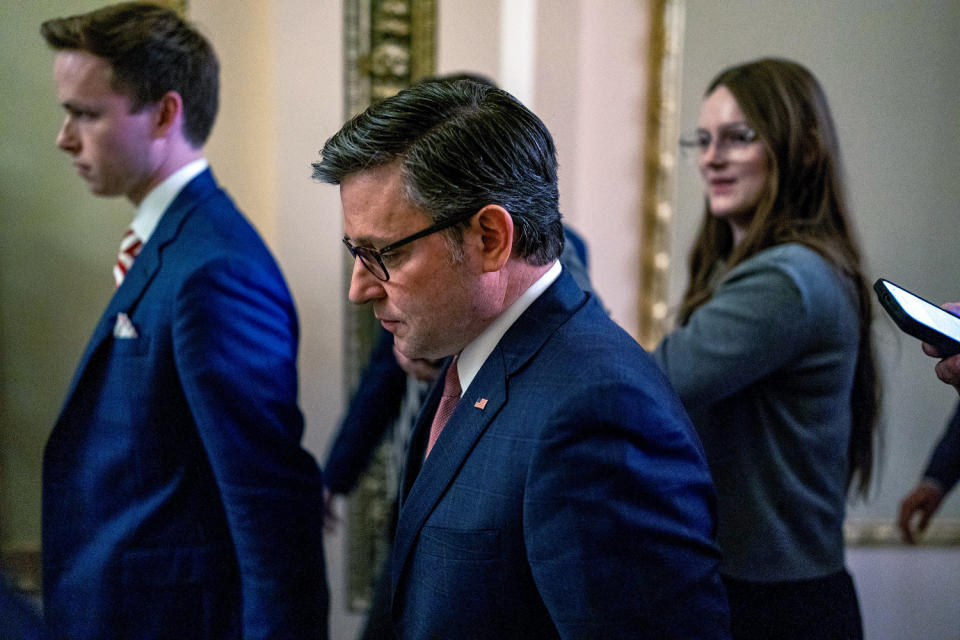WASHINGTON — Congress overwhelmingly passed a funding bill Wednesday to avert a government shutdown next week after House Republicans removed a proposal demanded by Donald Trump that would require Americans nationwide to show proof of citizenship to register to vote.
The Senate voted 78-18 Wednesday evening, shortly after the House passed the same measure on a 341-82 vote, with all opposition in both chambers coming from Republicans.
House Republican leaders, facing defections within their ranks, relied heavily on Democratic votes to approve the short-term measure. It now heads to President Joe Biden, who plans to sign it well before the Tuesday shutdown deadline. Both chambers are set to adjourn this week for a lengthy recess and will not return to Washington until after the Nov. 5 election.
The package, negotiated by House Speaker Mike Johnson, R-La., and top Democrats, would fund the government at current levels through Dec. 20, setting up another spending fight right before the holidays. It would also provide $231 million in additional money for the Secret Service, including for operations related to the presidential campaign, in the wake of two apparent attempts to assassinate Trump.

Trump has publicly insisted that congressional Republicans shut down the government unless they can enact the proof-of-citizenship election legislation, known as the SAVE Act, even though it’s already illegal and rare for noncitizens to vote in federal elections.
But after the House rejected a package that combined government funding and the SAVE Act last week, Johnson stripped out the Trump-backed election legislation and brought the new, mostly clean spending bill to the floor. Defending the move, Johnson and other key Republicans have argued a GOP-led shutdown just 35 days before Election Day would amount to “political malpractice.”
Johnson denied he’s “defying Trump” over the voting legislation, arguing that they have been in close contact throughout the funding fight and that they both believe the SAVE Act is critical to ensuring election integrity.
“I’m not defying President Trump. I’ve spoken with him at great length, and he is very frustrated about the situation. His concern is election security, and it is mine, as well. It is all of ours,” Johnson told reporters Tuesday.
He blamed Senate Majority Leader Chuck Schumer, D-N.Y., for failing to take up the SAVE Act as a stand-alone measure in the Senate. “We passed the SAVE Act in the summer, and it’s been sitting on Chuck Schumer’s desk collecting dust; that is maddening to us,” Johnson said. “President Trump understands the current dilemma in the situation that we’re in, and so there’s no daylight between us.”
Once signed into law, the stopgap bill will set up another shutdown battle in the postelection lame duck session, but with the benefit of both parties knowing the balance of power next year.
“I think the vast, vast majority of Congress does not want a shutdown,” said Sen. John Boozman, R-Ark. “So let’s get through the election and decide what we want to do.”
The short-term funding bill, known as a continuing resolution, or CR, required two-thirds support to pass in the House because it came to the floor under an expedited process known as “suspension of the rules.” That was needed because conservatives on the Johnson-aligned Rules Committee refused to help advance the package through the committee.
“It’s the same kicking the can down the road,” lamented Rep. Dan Bishop, R-N.C., a member of the far-right Freedom Caucus who opposed the CR.
Rather than blame Johnson, former Freedom Caucus Chairman Scott Perry, R-Pa., pointed the finger at Senate Democrats, who didn’t pass any of the 12 annual government funding bills for the new fiscal year.
“You always blame all this stuff on us, but the Senate has put zero appropriations bills on the floor. Zero,” Perry said. “You’re supposed to have a dance partner, and our partner refuses to show up.”
Schumer said he’s pleased that the House GOP learned that “partisan bully tactics” don’t work on funding measures while chiding them for wasting time.
“There will be no shutdown, because finally, at the end of the day, our Republican colleagues in the House decided to work with us. … I hope the House will have learned its lesson that once again, listening to the hard right on these vital issues — to funding the government, to avoiding default — cannot lead to anything that is useful or constructive,” Schumer said before the vote Wednesday. “In fact, I hope this positive outcome of bipartisanship can set the tone for more constructive bipartisan work when we return in the fall.”
This article was originally published on NBCNews.com


